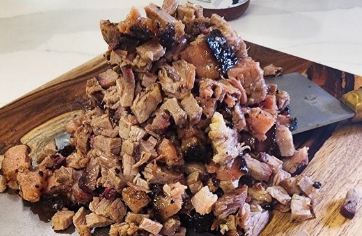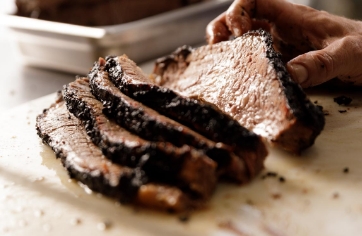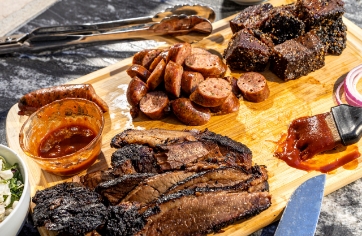Best Rub for Smoked Brisket
In part 4 of our BBQ & A with Crossbuck's pitmasters Tim McLaughlin and Damian Avila, we tackle the controversial topic of "What's the best rub for a brisket."
Background
The discussion about "What's the best rub for a brisket?" can run the gamut from "just use salt and pepper" to "the key to my brisket is my super-secret rub recipe."
BBQ Student: How did you determine what spices you wanted in your rub?
Tim: As a student at Le Cordon Bleu, one of our final tests was to blind taste and identify 100 spices. It was tough, but when I went back to Le Cordon Bleu to teach many years later, I loved this test and typically could identify all 100. I also taught a class on Flavors. Basically, this is what chefs do...so yeah, we are always experimenting with different flavors.
BBQ Student: So, adding sugar makes you a bit of a maverick in the Texas BBQ scene?
Tim: Well, in Dallas, we love our Mavericks. So there is no shame in being called one. However, sugar is prominent in rubs all over the country so it makes no sense to me that anyone would have an issue with using it on brisket. I think the problem is that people are either using brown sugar or cooking at too high of a temperature for the sugar to react properly.
BBQ Student: What's the problem with brown sugar again?
Tim: Brown sugar is just not something you can cook for 16-18 hours. It'll burn out, caramelize too fast and the bark on the brisket would suck.
BBQ Student: What does caramelize mean again?
Tim: Caramelization is the process that occurs when meats, vegetables and anything else are exposed to heat that causes the sugars to break down into complex polymers and take on different tastes and appearances. For us, this is the process that gives us our nice golden brown "sugar-cookie-crust."
BBQ Student: So, in Aaron Franklin's A Meat-Smoking Manifesto, he says...
Sugars: Almost every commercial rub has a high level of sugar. I like sweets plenty, but not on my barbecue. There, I've said it. Surgary rubs burn and turn bitter when exposed to high heat for too long and are a way to cheat the acquisition of bark over a long cook.
BBQ Student: Is he calling you a cheater!
Tim: Aaron's a good dude. I think I may have called him a cheater for wrapping his briskets...so perhaps he's digging at me for using sugar. Whether you want sugar in your rub or not is up to you, but you gotta know your temps...or as he says...you could burn it.
My understanding is that Aaron cooks at 275 degrees and then wraps (or steams) his briskets in butcher paper...which probably pushes his cooking temps over 350° and that may be why he has had a bad experience with sugars.
Our experience is that the white sugar we use in our rub - in pretty small amounts mind you - does not burn at the low temperatures we use...typically 225°. Sugars typically start caramelizing near 270°, but they resemble more of a soft, gummy bear like consistency...not a hard bark. Given that no areas of our smokers get to high heat levels, I can safely say that sugar is not aiding in the "acquisition of the bark"...rather, it exists as one of the flavors that we layer into our bark.
Plus, the sugar accounts for less than 10% of our rub's makeup so it's not like we are trying to candy it. When we do that...we call it Brisket Candy and it's one of our most popular items at Crossbuck BBQ.
BBQ Student: Are there any spices you recommend not using?
Tim: So, I was judging a BBQ competition once and I put in my own notes that I thought no one would read, "Why in the hell did they put anise in their rub?" Turns out, the event organizers gave my notes to the contestants and these guys came up afterward and were like, "How did you know there was anise in our rub...that's our secret ingredient." I kind of learned from that experience that people like what they like. So, even though there are plenty of spices I would never want near our briskets, I'm not going to act like judge and jury over what people should like.
Hell, I dipped our Brisket Candy in chocolate and served it with ice cream once. Part of being a chef is trying new things and having fun.
BBQ Student: So you call your rub El Guapo...Named after the villain in The Three Amigos?
Tim: No...is that one of your obscure 1980's movie reference?
BBQ Student: It's not that obscure...it had Steve Martin, Martin Short and Chevy Chase in it.
Tim: It was actually named after a bull in the Disney movie Ferdinand - that I watch with my kids.
BBQ Student: Is it a super-secret?
Tim: Not really. However, I'd hate for people to think that just because they used our rub..that they could make a great brisket. First, our rub was designed specifically for our beefs and briskets. It was formulated to work with the wood and smoke we selected...and our cooking process. If you change up all these variables, you'll get different results.
Also, it's important to note that we use a lot really fresh spices...we're not pulling down that container that's been sitting in your pantry for 3 years and that sat on the store shelf for 6 months before that.
Ship Crossbuck’s Central Texas Style BBQ Nationwide

Chopped Brisket
Served in convenient oven-safe, vacuum-sealed, 1 lb. bags.

Sliced, Half or Whole Brisket
Served in convenient oven-safe, vacuum-sealed, bags.

Samplers and Gift Packs
Central Texas Style Brisket + other Crossbuck favorites.
